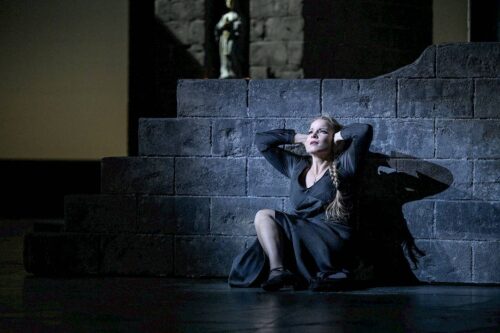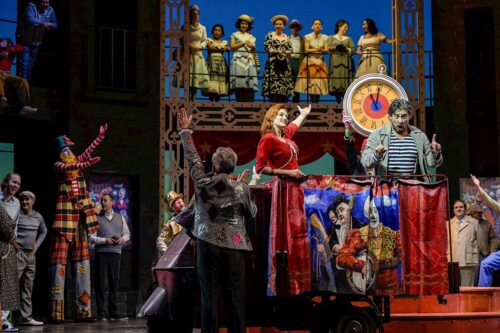 Switzerland Mascagni’s Cavalleria rusticana and Leoncavallo’s Pagliacci: Soloists, Chorus of the Zurich Opera, Philharmonia Zurich / Paolo Carignani (conductor). Zurich Opera, Zurich, 18.1.2022. (JR)
Switzerland Mascagni’s Cavalleria rusticana and Leoncavallo’s Pagliacci: Soloists, Chorus of the Zurich Opera, Philharmonia Zurich / Paolo Carignani (conductor). Zurich Opera, Zurich, 18.1.2022. (JR)

Production:
Producer – Grischa Asagaroff
Set and costumes – Luigi Perego
Lighting – Hans-Rudolf Kunz
Chorus master – Ernst Raffelsberger
Cavalleria rusticana
Cast:
Santuzza – Elīna Garanča
Lola – Svetlina Stoyanova
Turiddu – Marcelo Álvarez
Alfio – George Petean
Lucia – Irène Friedli
Pagliacci
Cast:
Nedda – Ekaterina Bakanova
Canio – Marcelo Álvarez
Tonio – George Petean
Beppe – Andrew Owens
Silvio – Xiaomeng Zhang
This is a revival of a fine Grischa Asagaroff production of these two exquisite gems of the verismo first seen in Zurich in 2009 with José Cura as the star tenor. Eight years later, another big name, Roberto Alagna, took his place, singing alongside his wife Aleksandra Kurzak. I was much taken by the production and though you can find details of the plots in my review of that run (CLICK HERE), I will repeat here the previous description of the set for these revivals and how it ‘resembles neither Sicily nor Calabria but a Tuscan hill-top village, such as San Gimignano with its impressive medieval towers (Mascagni hailed from Tuscany). In Cavalleria rusticana a ‘tower’ provides a dwelling each for Alfio and Lola, Turiddu and his mother Lucia, and a church. Costumes are almost completely monochrome, set in around the 1920s; the stage is gloomily dark.’ And for Pagliacci how ‘the stage set remained identical (so it was the same village) but for some flashing neon lights for the circus. Brighter lighting gave the towers a more friendly hue. Costumes were colourful but not gaudy; we moved on to the 1950s.’ Now, hopefully after the peak of the Covid pandemic, comes yet another run, this time with Marcelo Álvarez as the leading tenor.
Turiddu in this production is a simple peasant, with other farmers as his friends, whilst Alfio is the wealthy businessman in this small Sicilian village: his henchmen are Mafia heavies. Costumes for Cavalleria are in shades of grey with little colour to be seen, apart – briefly – from a procession into church on Good Friday (the small organ behind the stage even managing to make the house vibrate!). Álvarez is a consummate actor and a fine singer, though the age gap between him and a young Lola in particular stretched credulity. Álvarez’s first aria, singing offstage to Lola, was beautifully sung; he impressed throughout, only one leap to a top note went awry. George Petean as Alfio found his opening aria a bit too high for his natural dark register, he is far more secure lower down. Towering over all them, though, was Latvian mezzo-soprano Elīna Garanča, who was simply spectacular. Whether piercing high notes or deeper tones, they were all highly impressive – and she can act. At the end, after all the lengthy curtain calls and some of the loudest and longest ‘bravi’ I have heard for a while at Zurich’s opera house, Garanča came out on her own and brought the house down.
In the minor roles, Irène Friedli as Lucia sang in the previous runs and is a local stalwart who never puts a foot or a note wrong. Svetlina Stoyanova as Lola has to act more than she has to sing, and did both well enough. The chorus were also stars of the show, fine singing across all voices. The orchestra were on good form, and Paolo Carignani was on top of the score, delivering punch and oodles of italianità.

After the interval, colour floods the stage with excellent lighting effects courtesy of Hans-Rudolf Kunz; the circus is brightly lit and colourful posters and costumes tell us the opera has changed.
Petean, as the misshapen Tonio, kicked off the opera with a fine Prologue, this aria being perfect for his range. Russian soprano Ekaterina Bakanova was a more than solid Nedda, with a clean, crystalline edge to her high soprano; her song to the birds was charming. Álvarez relished his role and his ‘Vesti la giubba’ was beautifully delivered.
American tenor Andrew Owens, as Beppe, impressed with his attractive lyrical tenor. Chinese baritone Xiaomeng Zhang sang a very firm Silvio. Once again Carignani in the pit could do no wrong.
But the evening undoubtedly belonged to Elīna Garanča – and she knew it.
John Rhodes
